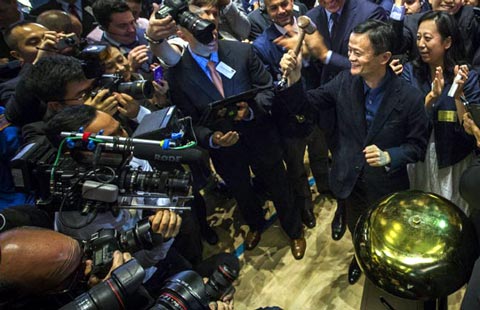Experts urge rational judgment of investment in Alibaba
(Xinhua) Updated: 2014-09-20 17:05If the interest rates increase in future, he expects a decline in stock market in general and Alibaba might suffer more from such a decline.
Lim holds a similar view with Purnaanandam.
The reason for high stock market valuations these days is because "money is cheap" due to central bank monetary stimulus around the world, Lim said.
It is hard to make a good return with stock values probably at their peak and bond prices likely to fall in anticipation of higher interest rates, she added.
Erik Gordon, professor of marketing at Ross School of Business, said: "I think the stock price will rise initially, stay high for a period of time, and then start to fall when investors have a clearer view of the company's future growth and profitability."
"Many Chinese tech companies fall out of favor in the US and European capital markets because the expectations regarding transparent disclosure and regarding corporate governance are different than what Chinese companies actually do."
"It is a cultural difference and a legal difference," he stressed.
If Alibaba wants to improve its competitiveness, Puneet Manchanda, professor of marketing at Ross School of Business, gave a three-point proposal.
Firstly, Alibaba needs to leverage mobile to accelerate growth in China via m-commerce.
Secondly, they need to forward integration and exploit adjacencies to their business to get fast growth. One such example is logistics and supply chain.
And thirdly, they need to target different geographies, for instance, outside China, which will be the most difficult for them as their amazing success is largely based on their deep understanding of Chinese consumers, the Chinese political system and the overall environment. It is not clear that this advantage will carry over to newer geographies.
But Professor Manchanda believes that Alibaba has delivered consistently for a long time and they have a good portfolio of three stable businesses - Alibaba, Tmall and Taobao. These will continue to generate good, if not spectacular, returns.
 |
 |
- Experts urge rational judgment of investment in Alibaba
- China aims to lower share of coal energy to below 62% by 2020
- Central bank injects SLF into major banks
- Alibaba aiming high with landmark IPO
- Business outlook sags again
- CCB and central bank in talks on liquidity infusion
- Service gets more attention in online shopping
- Chinese buyers go the extra mile for new iPhones

















